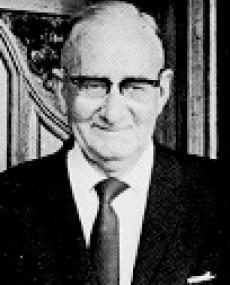
Leopold ‘Leo’ Marquard was born on 15 June 1897 in Winburg in the Orange Free State. His father was Reverend J. J. T. Marquard of the Dutch Reformed Church and his mother, Margaret, was also at the forefront of church’s activities. When World War I broke out, Leo joined his brother who had enlisted for service in Europe. He served in the Royal Air Force until his departure to further his education.
In 1920 he was awarded a scholarship to study at Oxford University where he completed his B.A (Hons) and a Diploma in Education in 1923. During his studies he became influenced by activities of the National Union of Students in Britain. On his return to South African, Marquard found work at Grey College in Bloemfontein as a teacher. It was at this college that he established the National Union of South African Students(NUSAS) in 1924. Despite not being student, Marquard became the organization’s founding president. One of Marquard students was Bram Fischerwhom he recruited into NUSAS and assigned him the task of editing the organization’s magazine.
During this period he was also part of the Bloemfontein Joint Council of Europeans and Natives. Driven by the ideals of liberalism, Marquard helped to establish the South African Institute of Race Relations in 1929. When World War II broke out, Marquard left his teaching job and enlisted in the army in 1939 and served until 1945. He was instrumental in establishing the Army Education Services working closely with Dr E. G. Malherbe. Marquard was promoted to the rank of Lieutenant colonel and subsequently awarded the M.B.E. (military). While serving the army he wrote a book on South African politics entitled ‘The Black Man's Burden’ under the pseudonym of John Burger which was published in 1943.
In 1945 together with Jan Hendrik Hofmeyr he represented South Africa at the United Nations Educational, Scientific and Cultural Organization(UNESCO)’s inaugural conference. He then worked as editorial manager of the Oxford University Press from 1946, a position he held until 1960. He was a member of the Editorial Board of Reality. During this period another book, ‘Peoples and Policies of South Africa’ which was published in 1950. He veered into politics and became one of leading figures in the formation of the Liberal Party of South Africa in 1953.
During 1972 there was increased attack on leading figures in South Africa who were opposed to the government’s policies. Amongst those attacked were Rev Theo Kotzeand Geoff Budlender. Leo Marquard’s home was also petrol bombed. At the time he was busy was organizing the Students’ Defence Fund. The following year (1973), he awarded an honorary Doctorate of Laws by The University of the Witwatersrand.
Marquard passed away on 27 March 1974. About two months after his death, the University of Natal also posthumously conferred him with an honorary degree.